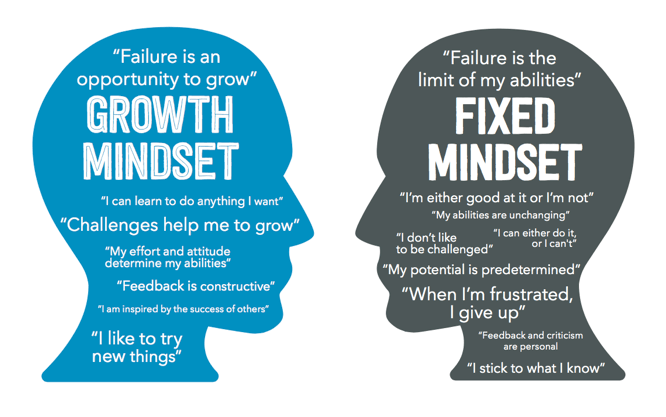You've probably heard your student say something like "I'll never be good at Spanish" or "I can't take that class—it's for students who are good at math." It's easy to get stuck in this mindset, thinking that if you're not good at something now, you'll never be good at it.
1. Model a growth mindset for your child.
It's not uncommon for people of our generation to have a fixed mindset—that was just the way of the world when we were growing up. Your parents may have even told you not to try certain things because you'd never be good at them—"it's just not in your blood."
In order to help your student develop a growth mindset, you'll want to develop one for yourself. Try new things, and communicate to your child how you find the challenge exhilarating. If your child sees you learning something new—something you've previously struggled with—they'll be more likely to imitate that kind of behavior.
2. Be explicit with your child.
Modeling a growth mindset is a subtle way to encourage your students to adopt that same mindset. But why not be explicit with them about the importance of a growth mindset?
Review the studies with them. Translate the scientific evidence for them. And
watch some of the powerful TED talks on growth mindset with them. Then, talk to them about how they can apply this to their own life. If your adolescent has a fixed mindset—thinking they can't grow in certain skills—it will be harder for them to take the subtle cues, so it's important for you to help them figure out how to develop that growth mindset.
3. Challenge the information they see every day.
It's easy for students to get caught up in the stereotypes and generalizations that come their way every day. "I can't do X well because of my gender." "I can't do Y well because of my ethnicity." Challenge these assumptions with your student, encouraging them to try to prove those assumptions wrong.
One way to do this is to help your student identify role models of people who broke those stereotypes. (Of course, you can be one of those role models too.) By seeing real examples of people who've used a growth mindset to overcome major obstacles, they'll hopefully be inspired to do the same.
Developing a growth mindset is an important life skill, but it's particularly valuable as your student starts the college application process. It can encourage them to try challenging classes they may have overlooked; it can help them stay motivated in academic situations that might otherwise be demoralizing; it can inspire them to join new clubs and groups that they otherwise may not have felt suited for. All of these things will help their college application shine—and, of course, they'll have a great story to tell in their essay.



